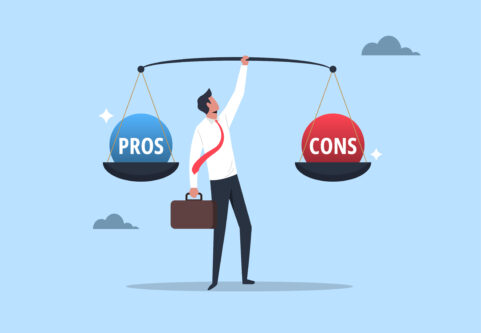Bankruptcy Advantages and Disadvantages

Before making the decision to go Bankrupt you should consider the main advantages and disadvantages. But remember they may not all be applicable to you.
Want help to go bankrupt? Give us a call (0800 044 3194) or click here to complete the form below and we’ll call you
Main Advantages of Bankruptcy
1. Fast Application Process
Bankruptcy can be implemented very quickly and gives immediate legal protection from your creditors. The application is made on-line. After submission you will normally be made bankrupt the next working day.
If you live in Northern Ireland the process takes a little longer because you have to present your application to the Court in Belfast.
2. Remain Bankrupt for just One Year
For most people Bankruptcy lasts just 12 months. After this time you are discharged. In certain circumstances the length can be extended but this it is rare.
3. Homeowners often keep their Property
You may believe going Bankrupt means you will be forced to sell your home. This is not necessarily the case. A property is only at risk if there is significant equity in it. If there is little or no equity it is likely that you will be able to keep it as long as you maintain your mortgage payments.
4. Further Debt Payments may not be required
Once you are Bankrupt you only have to make ongoing payments towards your unsecured debts if you can afford to do so. If you have no disposable income you will not be required to make any additional payments unless your circumstances improve.
5. Debt written off
Once your bankruptcy is over your unsecured debt is written off. You are no longer responsible for paying it unless you already have an Income Payment Agreement or you are required to release equity from your property.
Want assistance with bankruptcy? Give us a call (0800 044 3194) or complete the form below.
Main Disadvantages of Bankruptcy
1. Property may be at risk if there is Significant Equity
If there is significant equity in your home the Official Receiver must realise your share for the benefit of your creditors. This could mean the forced sale of your property if the cash cannot be raised in any other way.
2. Your may have to buy a Cheaper Car
You are allowed to own a car while you are bankrupt if you need one. However its value will normally have to be no more than £1000. If your car is worth more you will have to sell it and get a cheaper one unless there are special circumstances.
If you go Bankrupt in Northern Ireland or Scotland the value of car you are allowed to keep is likely to be slightly higher.
3. Credit rating affected for 6 years
The fact that you have gone bankrupt is recorded on your credit file. This record remains for 6 years from the start date. Your ability to get new credit facilities during this time will be severely restricted as a result.
4. Restricted Living Expenses budget
Once you are bankrupt you will have to live within a restricted living expenses budget. The Official Receiver (OR) will review your living expenses in detail and require you to make a payment towards your debts if you have surplus income
After you go Bankrupt you will always be allowed to keep as much of your income as you need to pay all of your priority debts and essential living expenses.
5. Recorded in a Public Register
The fact that you have gone Bankrupt is recorded in the Insolvency Register. This record remains until you are discharged. A permanent record of your bankruptcy is also archived in the London Gazette.
6. Some jobs are affected
The majority of jobs are not affected at all by Bankruptcy. However there are some roles that you will be prevented from carrying out for the duration of your bankruptcy. These include Company Directors, Accountants and Solicitors. Having said that this restriction applies only while the bankruptcy lasts which is normally just one year.